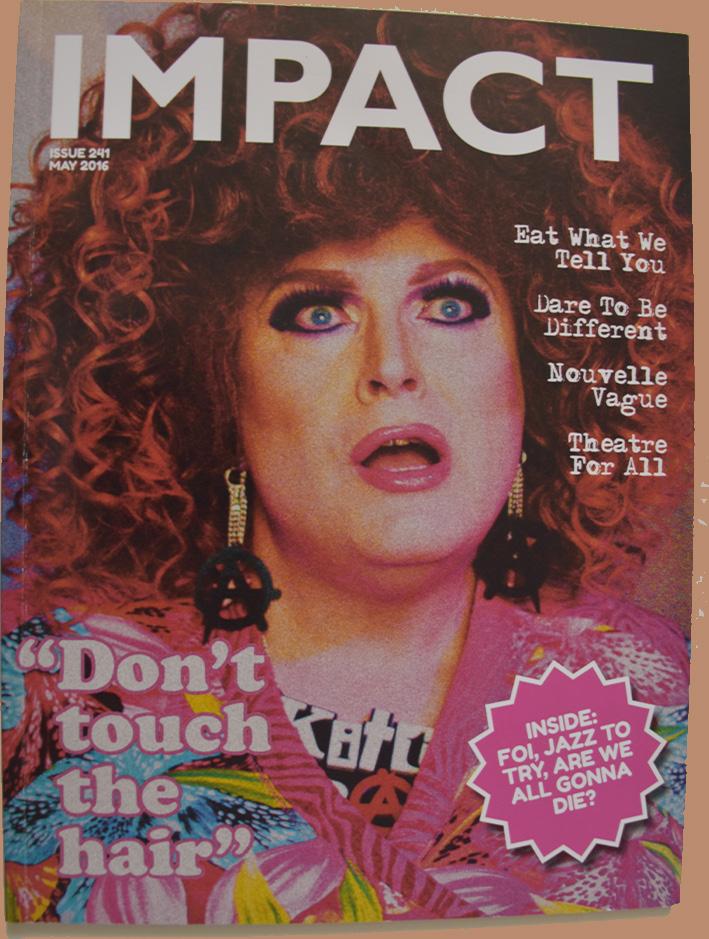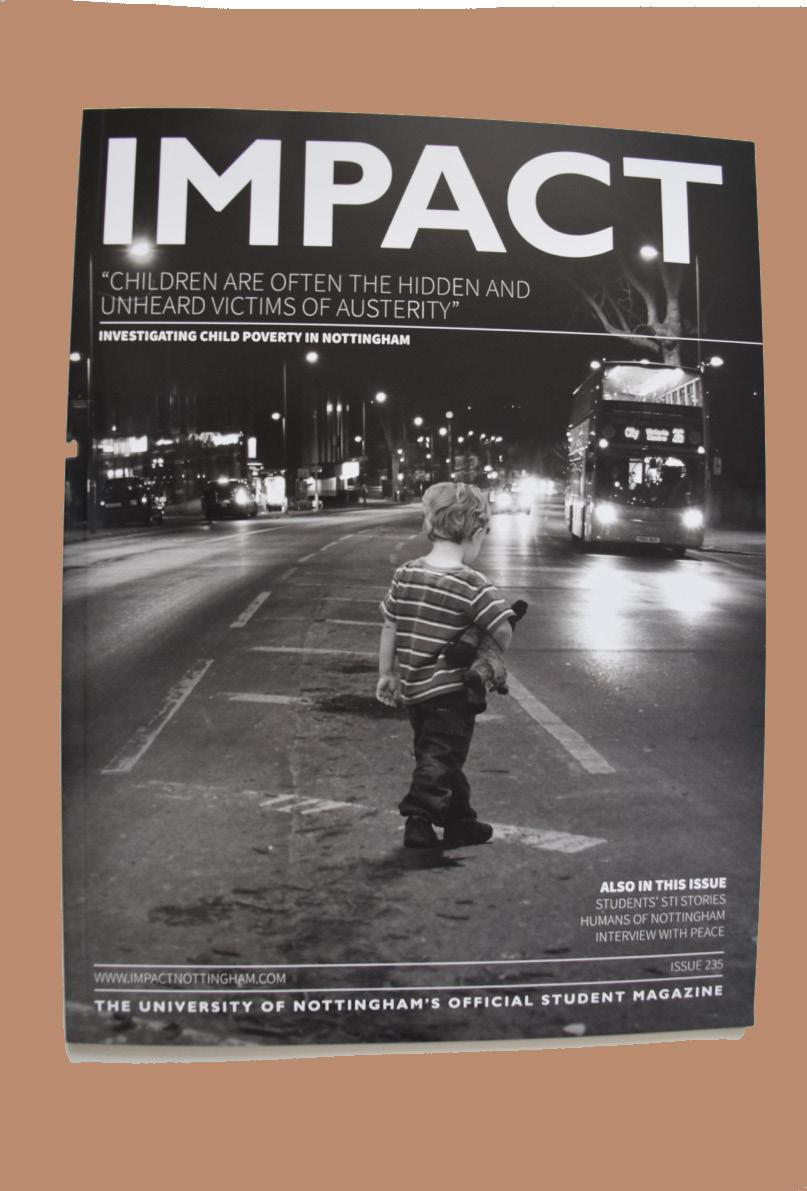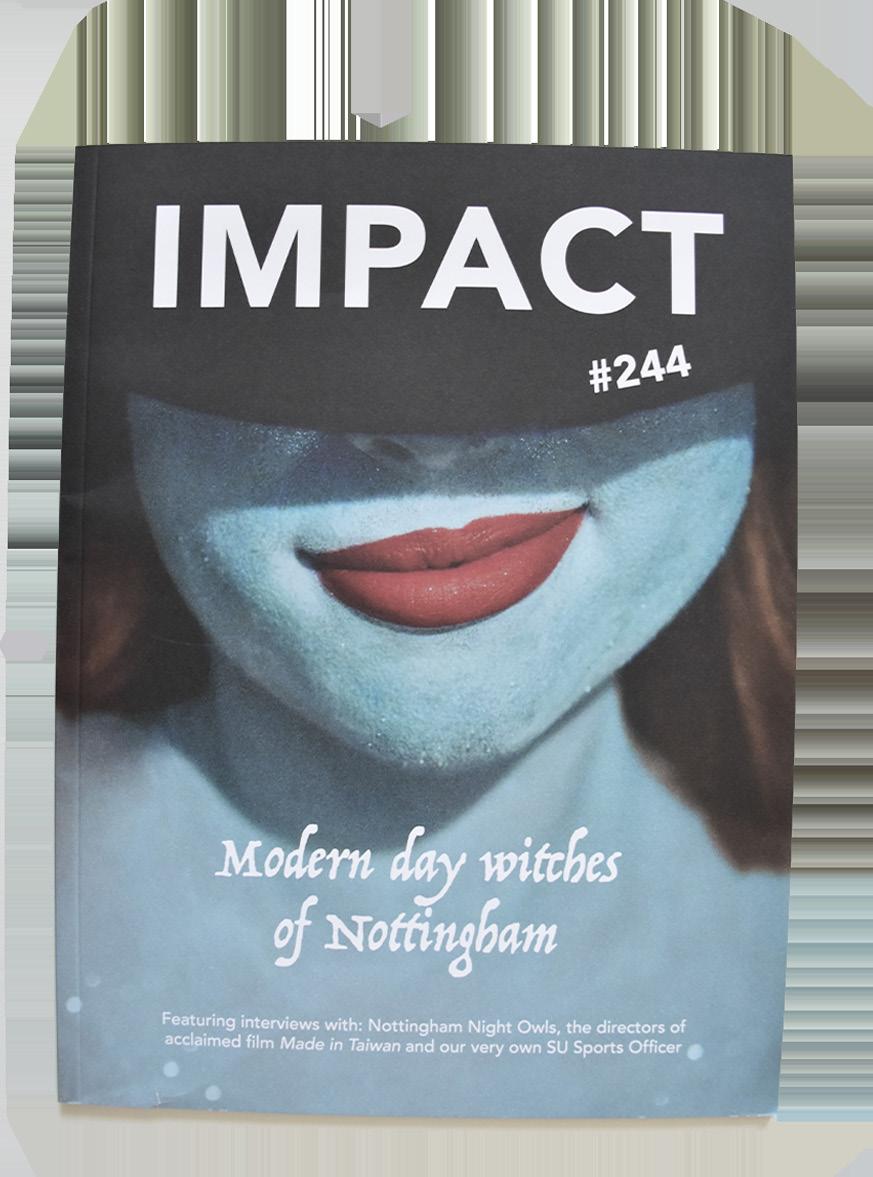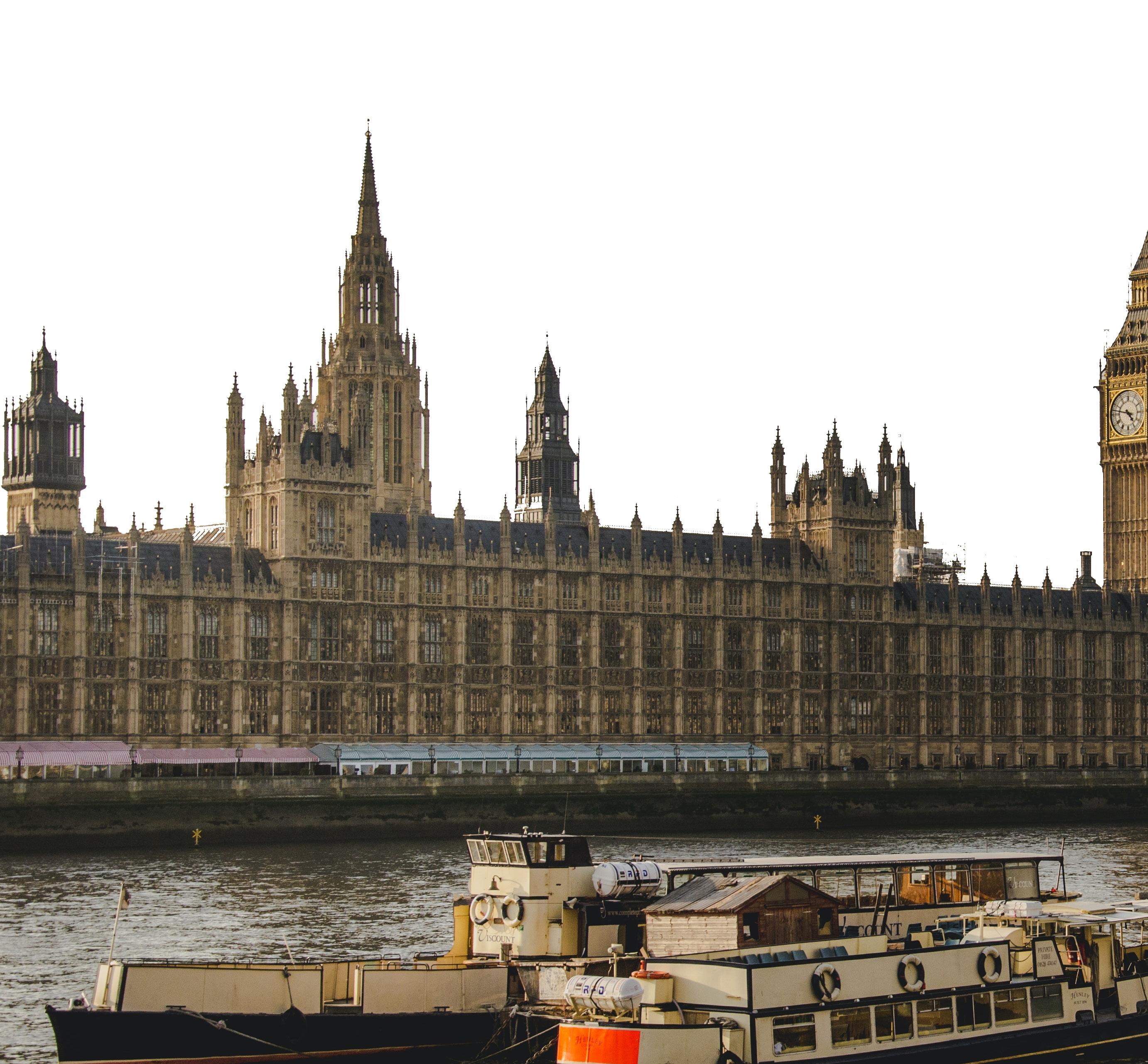
10 minute read
Impact Through the Years
from Issue 266 - Us
Impact
Through the Years







Politics :
A Story of Divisiveness and Tribalism
By Lauren McGaun Page Design by Chiara Crompton
We are often told about the ubiquity of an ‘Us vs. Them’ politics in modern Britain. But do we all really know what this means when we hear it? Impact’s News Editor Lauren McGaun explains what the term means, and how the phenomenon is having a corrosive effect on British media and political discourse.
‘Us vs Them’ politics is the psychological term used to describe the divisive and turbulent political era we are currently experiencing: partisanship is rife and collaboration is close to non-existent.
Whether it be Brexit or tuition fees, the divisiveness of policy decisions that affect the general public has led to a huge disconnect between the ‘people’ and ‘those in power’.
Author and journalist, Amanda Ripley, has written extensively on the issue of ‘Us vs. Them’, with her latest book, High Conflict – Why We Get Trapped and How We Get Out, in which she examines the boxing of individuals into narrow categories and how this can lead to further divisions, with the distinctions between people’s roles causing them to clash ideologically.
In examining the term ‘High Conflict’, Amanda characterises the ‘Us vs. Them’ divide as something which morphs into an evil ideological feud. “High conflict is what incites people to lose their minds in ideological disputes, political feuds, or gang vendettas”, she explains. Whilst ‘Us vs. Them’ politics is most evident at the highest levels of government decision making where referendums have the power to split populations, this kind of politics can equally be found at a smaller level, particularly in corporation spheres. Wherever there exists a perceived ideological threat from an elite or opposing party, groups who are often in a weaker position embody the characteristics of these politics, protesting what they see as an oppression of their rights.

‘In the UK, party political allegiances and ‘Us vs. Them’ politics have grown to such an extent that any bipartisan, pluralist visions seem like a long distant memory’
In the UK, party political allegiances and ‘Us vs. Them’ politics have grown to such an extent that any bipartisan, pluralist visions seem like a long distant memory. As Guardian columnist John Harris noted in 2018: “our new political culture has superseded the dominance of what some people call ‘centrism’...This has grim consequences, not least for our collective sense of priorities.”
With politicians’ political rhetoric, both inwardly and outwardly, forming a culture which breeds hatred and division, the UK media has naturally clung on to the most divisive political issues in its main news coverage, whether this be coverage of race, Brexit or immigration. This is while topics where the general public can often display more consensus, such as climate change, have been all but cut from headlines.
And the issue doesn’t just stop at mainstream politics. Universities have long been the cultivators of intellectual debate and political discussion, offering a safe space in which to do this. Where the problem lies, however, is with the vast socioeconomic and ethnic diversity of the student population, resulting in ideological clashes based on preconceived views from vastly opposing backgrounds.
‘Despite all its bad elements, the pandemic has brought us all together, diminishing the gap between ‘us’ and ‘them’’
Perhaps, all hope is not lost, however. Despite all its bad elements, the pandemic has brought us all together, diminishing the gap between ‘us’ and ‘them’. What will be essential going forward, many argue, is not allowing this bipartisan culture to continue so that consensus and discussion can once again become a central feature of British politics.
Features


Not Indian Enough

Nila Varman recounts her experiences as an individual of South Indian heritage living in the UK. She explores the sense of not feeling ‘Indian enough’ and recalls the discrimination she faced from some of her peers.

‘Indian enough’. What does that even mean? Honestly, I didn’t know for a long time either. Growing up, I assumed my respect and love of the culture fundamental to my upbringing was the definition of being Indian. What more could it mean? I grew up adoring my brown skin for the most part, honouring the fact I was able to speak Tamil, the oldest spoken language in the world, and immersing myself in the history, art, food—all whilst navigating a tightrope between the Indian and British experience.
Nonetheless, within some communities, I’m perceived as too Indian, due to my bilingual abilities, my love of Carnatic music, and my habit of sprucing up dishes with spices. I was one of two Indian kids at school, the other being my brother, and although I’d always been surprisingly comfortable around my non-Brown peers, I became increasingly unsettled as I grew older. Unsettled by the reality that having a South Indian identity would sometimes invite ridicule and shame from my Brown friends.
You’d think I’d feel comfortable amongst people who look like me. I wish you were right. On the contrary, in certain Brown communities, I’m often made to feel ashamed about my culture, as though I’m ‘not Indian enough’. I frequently find myself trying to explain that just because my family doesn’t originate from a certain region of India, or just because I’m a non-Hindi speaking South Indian, that doesn’t mean I’m out of touch with culture or that I don’t explore other traditions. I’ve realised now that identifying as ‘Indian enough’ doesn’t mean ticking an artificial and arbitrary ‘criterion’, which in itself is merely the modern manifestation of years of noxious stereotypes. Rather, my Indian identity is a reflection of how I feel on the inside.
‘I’d overhear conversations about how ‘oily, gross, dark skinned and ugly’ South Indians are’
When I spent time at an Indian school, I suffered one of the most belittling experiences of my life: being discriminated against by fellow brown peers. I was teased for my South Indian heritage and subjected to every lazy stereotype in the book. I’d overhear conversations about how ‘oily, gross, dark skinned and ugly’ South Indians are. I’d be excluded from conversations where my peers would speak in Hindi and prod me to contribute once I’d learned their language—if I didn’t, I was thought to be insufficiently Indian.

‘I once took a rubber and tried to rub my skin in the hopes I could make it lighter, because kids at school associated attractiveness with light-skin’
Sometimes, I was too dark, other times, not dark enough. My knowledge of topics would be doubted or disregarded because I was either ‘too South Indian to know’, or because I was born and raised in the UK. As a condescending consequence, many would feel the need to explain to me (or more accurately, explain at me) the obvious, not bothering to hear my perspective. I’d be tirelessly mocked for the coconut oil with which my mum would treat my hair or imitated when speaking Tamil. I’d never felt so alienated, and the false standard of being ‘Indian enough’ descended from a risible non-issue to a confidence-killing anxiety. I once took a rubber and tried to rub my skin in the hopes I could make it lighter, because kids at school associated attractiveness with light-skin. Suffice to say, the experiment left me with only sore red marks.

‘I ultimately realised, however, that what mattered was simply what I thought of me’
I tried becoming something I wasn’t because I was so blindly ashamed of being a dark-skinned, Tamil-speaking girl from Manchester. I ultimately realised, however, that what mattered was simply what I thought of me. I didn’t understand why I so desperately craved approval from those who would never regard me as anything more than a little brown dot amongst countless others.
Today, I’m outspokenly proud of my heritage, of the values my Amma and Appa instilled in me, yet I still struggle to carve a space within the Brown community in certain settings. Over the years, I’ve found myself gradually peeling away from the pernicious question of whether I’m ‘Indian enough’, and focusing instead on how to be Nila, by reaffirming the love I have for my upbringing and culture. This little epiphany didn’t come easily—you can’t have light without heat. Though I wouldn’t wish such a punishing climb on anyone else, when I pause to appreciate the perspective it’s imprinted upon me, I wouldn’t change a thing.
Photos courtesy of Nila Varman
By Nila Varman Page Design by Chiara Crompton


Gaining Some Per-speck-tive
Life on Earth has been far from easy this last year. But, Niamh is here to offer some advice and perspective on how small our Nottingham bubble, yet alone the planet, is compared to the universe.
I’m not sure if anyone’s ever told you this, but you’re pretty inconsequential. Don’t get me wrong, I’m sure you’re a lovely person —well-meaning, affable, filled with hopes and aspirations—but this is a friendly reminder that you’re nothing out of the ordinary.
Now hold on, don’t take this personally. The Darwins and Newtons and Shakespeares and Columbuses of the world, they didn’t matter either. “But evolution? Gravity? Theatre? Discovery? How on Earth can you claim these things don’t matter!” I hear you cry. Well, you see, that’s just it. The answer is in your question: “How on EARTH?” I’m not thinking in Earth terms; I’m thinking big picture here.
The Milky Way is one of approximately two trillion galaxies in the Universe, so even if we imagine Earth as a solitary sand grain in the Saharan Desert, we’re still nowhere near comprehending how utterly microscopic we are within time and space. We’re all miniscule specks on a tiny planet in a single solar system amidst a potentially infinite universe. It’s not exactly like anything we do really matters.
Now, this is probably sounding like a heck of a lot of bad news (particularly for those of you who’ve wasted precious seconds entering the Notts BNOC competition, only to find out, by cosmological standards, you’re actually a Big Not Of Consequence), but allow me to provide some solace.
If we are so utterly inconsequential, if even humanity’s greatest goals, that of solving climate change, achieving world peace and curing cancer, are dwarfed in the reality of a universe so vast, surely our day-to-day mundane problems must hardly matter at all? As I accidentally blast Britney full volume from my phone rather than my headphones on a packed commuter train, or mistakenly turn my camera on mid-lecture whilst shovelling food into my mouth, I remind myself that life is much too short to be spent worrying about such trivialities.
Even when life tosses us a real curved ball, sudden unemployment or the loss of a loved one, remembering that we are part of something much bigger than ourselves can have an unmistakably grounding effect.
‘Remembering that we are part of something much bigger than ourselves can have an unmistakably grounding effect’ ‘Why sweat the small stuff when the human race is a speck anyway?’
When we realise that nothing matters, we free ourselves to decide exactly what we want to matter. Simply put, our only real purpose on this funny little space rock is to enjoy ourselves and encourage others to do the same. Why sweat the small stuff when the human race is a speck anyway? That essay you’re freaking out over is an even tinier speck. That date you’re too scared to go on is an even teensier one.
That year travelling is a mere blink of the universe’s infinite eye. Take risks. Live boldly. As the wise Paulo Coehlo said, life is a mere moment, a “little parenthesis in eternity”; we must use it “to meet, to love, to share”.
… Not to sit replaying the moment my cereal-stuffed face flashed onto the screen of a one-hundred person Teams call.
Speck or no speck, though, I’m still getting over that one.






